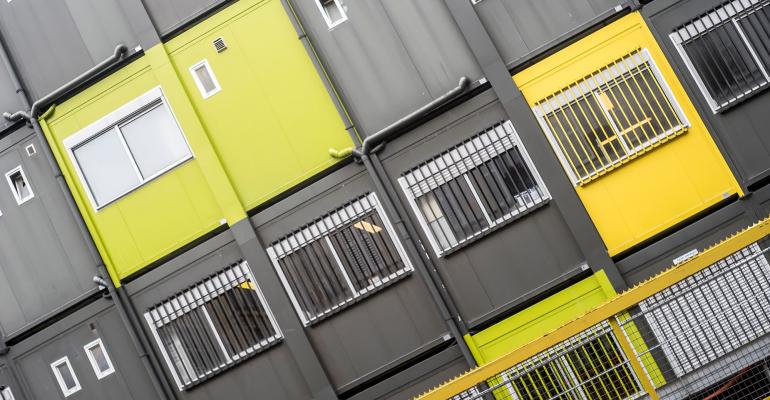Computing power is a vital part of any business infrastructure, and corporate tenants want state-of-the-art data center capabilities on site. This represents a substantial investment for developers, especially because the cost to build a data center is now about $200 per sq. ft. Anything that can cut data center costs, shorten delivery time, and provide permanent power sooner benefits both developers and tenants, which is why more commercial projects are deploying modular data centers.
Until recently, modular data centers were considered to be stop-gap installations used by the military or government agencies to help cope with regional disasters. These applications only proved the value of a modular approach to data center design. By making more efficient use of available space, including power and utility space, you can increase data density, cut costs, and shorten time to revenue. Modular data centers help turn real estate investment into revenue faster by providing a customizable, scalable computing operation.
Why build when you can go modular?
There are a number of factors driving the adoption of modular data centers. First, they give building owners and tenants greater control over their data infrastructure. Modular does not mean cookie-cutter. These modular, factory-built data centers are designed, constructed, and tested to exacting specifications and can be easily upgraded to meet changing data processing needs. In fact, large collocation facilities are opting to go modular, integrating ready-to-install data centers in order to cut construction time by an average of 30 percent.
Going modular addresses practical construction issues as well. For example, the ongoing shortage in skilled labor is impeding data center construction everywhere. Nine of the 10 largest construction projects in 2018 were data and fulfillment centers for Facebook, Apple, Microsoft, and Amazon. The few skilled electricians and engineers available are assigned to, and focused on the big projects, making it harder to find the labor needed for regional enterprise projects. This leads to construction delays and the need to hire more expensive subcontractors.
Modular data centers eliminate this need for skilled, on-site labor. Modular data centers also optimize the use of available real estate. Rather than requiring large buildings, modular data centers have a smaller footprint and can be installed in a parking lot or adjacent to a building. This not only saves space, but it also allows developers and tenants to make last-minute decisions about data center requirements without delaying construction.
What we mean by modular
There are still many misconceptions about modular data centers. Most people typically think of containerized data centers delivered in a standard ISO shipping container and installed on a skid. Those eyesores are still occasionally used, but more often you will see data centers composed of prefabricated sections that can be installed in a data center, added to the exterior building, or become a self-standing structure. Each component is wired and tested prior to delivery, and once on-site, the components are assembled into a finished data center, complete with power distribution, cooling, battery backup, and enclosure racks.
Most people also consider modular data centers as temporary, but in fact, they are ideal as permanent installations. They are resilient, easy to secure, easy to upgrade, and are designed to deliver years of service at substantially lower operating costs.
Additionally, modular data centers are already optimized for performance. The wiring infrastructure is ready-built, so there is no risk of creating possible points of failure during construction. Even upgrades are optimized to be plug and play.
In short, modular means you have options. The data center comes ready for commission, but it can always be scaled with less operational risk and less strain on the power and environmental systems.
The benefits of predictive costs
For real estate developers and builders, the real advantages of modular data centers are fixed costs and reliable schedules. With a modular data center, you are purchasing a completed product at a fixed price ready for delivery.
When you build a data center from the concrete pad up, you have to estimate time and materials, as well as labor. There are many variables that can affect construction costs, including materials, weather delays, labor problems, and equipment failures. When you are dealing with time and materials, there are too many elements outside of your control that will impact final costs.
With a modular data center, everything is fixed in advance. The specifications for the data center are predetermined, including size, power requirements, cabling, cooling, and the number of racks, making costs predictable. Manufacturing, testing, and delivery are also included in the fixed price, so there are no unforeseen adjustments. When the completed modular data center is delivered, the cost of installation can be included in the contract or you can use your own labor to complete the wiring (if you are willing to pay for time and materials).
Those predictive costs apply no matter where you are building, but because manufacturing and testing is off-site, you aren’t subject to variables such as local labor costs and building expenses. The cost to manufacture and install (rigging/setting/utility wiring costs will vary by site) the data center is the same for all locations, whether it is being delivered to New York City or Omaha.
In many ways, you can think of a modular data center as another piece of building equipment. It has a fixed cost and is delivered and installed just like any other building system, with all the associated warranties. This piece of equipment, however, is built to specification and shortens time to revenue, and that’s a win for any real estate investor.
Jason J. Ball, P.E. serves as engineering manager with PCX Corp., where he oversees design, development, and production of custom data center projects. The privately held Clayton, N.C. company designs and manufactures prefabricated electrical power distribution systems for the commercial construction, modular data center, and industrial/utility industries worldwide.





